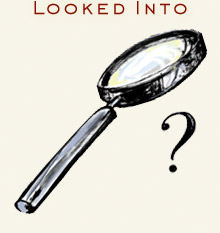Emdashes—Modern Times Between the Lines
The Basics:
About Emdashes | Email us
Ask the Librarians
Best of Emdashes: Hit Parade
A Web Comic: The Wavy Rule
Features & Columns:
Headline Shooter
On the Spot
Looked Into
Sempé Fi: Cover Art

I'm supporting NPR this week by having it on a lot. So yesterday Terry Gross interviewed Nick Hornby about A Long Way Down, his new novel of dark-comedic suicidal contemplation, which I'm reviewing in this Sunday's Newsday. I happen to have just started reading Curtis White's The Middle Mind: Why Americans Don't Think for Themselves, which includes the lambasting of Gross' show that was that bombastic Harper's Reading a few years ago. White writes: "Terry Gross's interest in books and writers is too often morbid, perverse and voyeuristic." I don't listen to Fresh Air very often since it's not at a convenient time, so I hadn't felt the force of his critique—in fact, suspected it was overblown—till yesterday, when she proved him right in almost every moment of her excruciatingly unpleasant interview. Pointlessly sadistic? Prurient? Unrelenting? Check, check, check. Say, Nick, did you ever have someone close to you kill himself? Uh-huh, so how did he do it? Gas, huh? Hmm; were you surprised?
Were you surprised? No, Terry, we were all relieved actually. One less thing to worry about. She also managed to discuss Hornby's autistic son—a character in A Long Way Down has a severely disabled child, though not autistic—in the most tasteless possible way, and I'm surprised Hornby didn't throw something at her. She pursued the following question with gruesome zeal: You know how your character Maureen, the middle-aged Catholic woman who's the mother of the disabled son, puts up posters that she's only guessing her son might have liked if he could? Well, do you do that? Like dress your son in music or movie t-shirts that maybe he wouldn't really like? Hornby was aghast but answered her questions in increasingly staccato and downbeat tones. Gross didn't seem to notice but kept sniffing, hunting, sniffing. Down, Cujo!
Indeed, Hornby was a trouper, and got through the interview politely and even cheerfully, if you discounted the trapped and miserable edge to his voice each time she did this. Gross also insisted on discussing this nuance of fiction technique: Which suicide method hurts the most, and since jumping off a building ("not that I've ever experienced this!"—yes, that explains why you're live on the radio right now) hurts the most, probably, why would you have your characters consider killing themselves that way? "Well," Hornby said (paraphrasing), "it wouldn't be as dramatic if they were all sitting separately in their cars. I had to get them to meet somehow, so I put them all on this rooftop so they could have a conversation." Here's White:
[T]here was a program in which Terry interviewed an author who had written a novel in which a woman says, "Drop dead," to her husband and the next day he does drop dead. Before the novel was published, the author's own real-life husband dropped dead on a tennis court. This was the point at which the book became interesting for Terry. If her poor husband hadn't dropped dead, Terry would never have been interested in her or her book for this Show of Shows. "What did it feel like to suspect you'd killed your own husband with your art?" Fresh Air? How about Lurid Speculations? It's like Dr. Laura for people with bachelor degrees. Car Talk has more intellectual content.
Hence, this examination in the tradition of Dwight Macdonald: Which of the characters, asked Gross, is actually Hornby in disguise, and how so, and then why ever did he put in a character that doesn't share his background and personality? (Meaning Maureen.) You'd think, in Gross' capacity as regular interviewer of fiction writers, she'd have read enough fiction by now to guess that maybe he made some of it up. Like a cheap TV prosecutor, she really, really wanted Hornby to admit that the failed rock guitarist, J.J., was modeled on himself. But all her questons were both wheedling and insinuating: We both know I know the answer. I'm just giving you a chance to say it first.
Call me middle-minded—and I'd say it'd be narrow-minded to do so on the basis of a radio station—but I like NPR a whole lot. (Witness the last few posts about excellent shows.) But after reading White's Harper's screed, which is a few years old now, wouldn't Terry Gross have responded by toning down the more irrelevant (and, more to the point, dull) prying and concentrating on her subjects' work? I don't think she's stupid; she just can't seem to let go of this very poor interview technique. Oh well. Read A Long Way Down anyway. It's a damn good novel.
The Middle Mind [Original piece; Context]
Categories: Hornby, Radio



